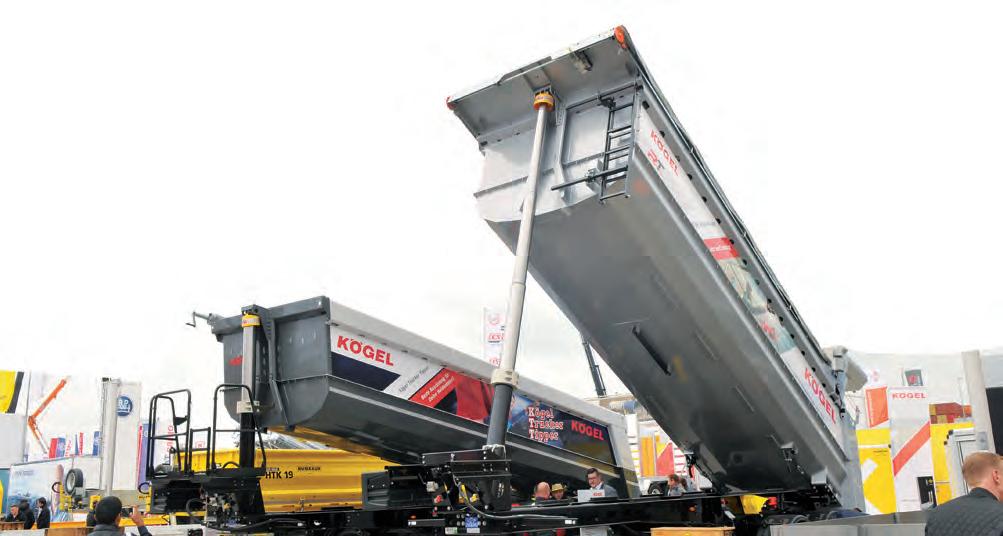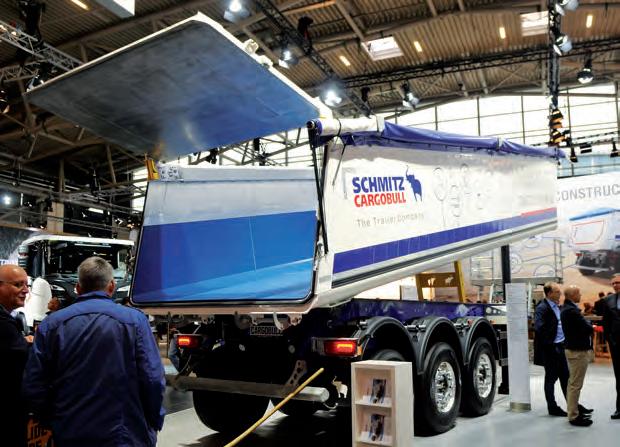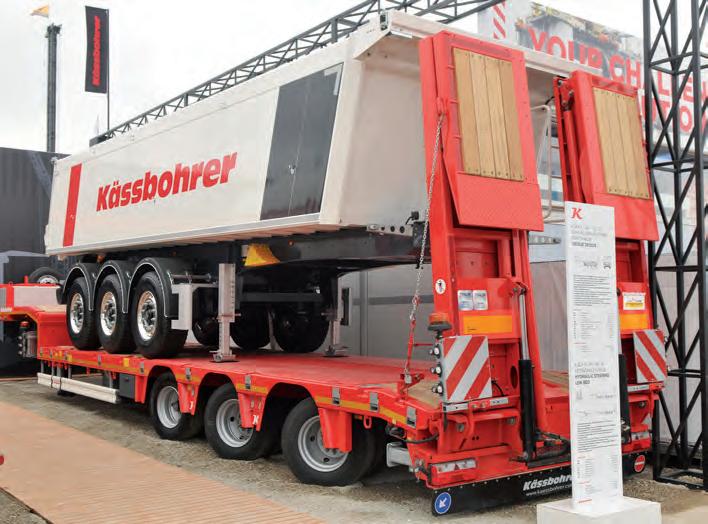
4 minute read
BAUMA 2019
CONSTRUCTION BAUMA SHOWS THE IMPORTANCE OF

TRAILER BUILDERS AND EQUIPMENT SPECIALISTS FROM ALL ACROSS EUROPE GATHERED AT THIS YEAR’S BAUMA TRADE SHOW TO DEMONSTRATE INNOVATIONS THAT SUPPORT THE CONSTRUCTION, MINING AND AGRICULTURE INDUSTRIES. [ Story by Tim de Jong. ] M ost of the European trailer builders represented at the gigantic Bauma show in Munich, which was held in April. Schmitz Cargobull was the only one with a stand in one of the many halls, while the others were grouped at the Freigelände Nord part of the open exhibition area.
In Germany, tippers are often used to complement road work activities. This is a big market when you consider that the government invests billions in improving its road freight arterial networks. Following this infrastructure spend, it makes sense that countless trucks and trailers are requisitioned to complete necessary road works.
This market trend has influenced Germany’s trailer builders, where just about every local OEM has their own tipper design spec’d for bulk haulage freight tasks. This year, the Germans expect a record of 538 roadworks sites all at the same time on their motorway network alone.
So, when Boris Billich, Sales Director of Schmitz Cargobull, told Global Trailer that Bauma is one of the most important venues for the brand to meet with customers, we think that we understand his point.
“Construction is one of the four pillars for Schmitz Cargobull,” Billich says. “The other three are reefers, curtainsiders and box trailers as well as box-bodies for rigids.”
He estimates the production of tipper trailers at 20 per cent of the total of Schmitz Cargobull. The tippers on display in Munich are all built at a specialised site in Gotha, in the east of Germany.
“In the past three years, this market grew by 10-to-15 per cent a year,” Billich says. “It’s very dynamic. With an estimated market share of 20 per cent, we are clearly number one. We are growing in a growing market.”
He concedes that this success has a downside with regards to delivery timeframes. “We are executing changes and we are investing further in our plant in Gotha to reduce delivery times. Also, we look to optimise deliveries of parts in order to smooth production and to speed it up while we are maintaining the same, proven quality standards.”
Schmitz Cargobull’s goals are obvious for 2019: Increase sales and decrease delivery timeframes.
Schmitz Cargobull has developed an inner protection layer when light aluminium box bodies are being used. According to the OEM: “Corroded and worn body finishes make unloading more time-consuming, complex and, last but not least, more
dangerous, as the load can only really start sliding properly at extreme tipping angles. Plastic body cladding ensures that the load slides from the loading surface more quickly and without leaving significant residue. The new OKULEN coating prevents bulk goods from adhering to the floor of the body and optimises the tipping process.”
Schmitz Cargobull is also keen to communicate the possibility of equipping the tippers with its telematics systems.
Aside from Schmitz Cargobull, other manufacturers offering tippers are Langendorf, Fliegl, Schwarzmüller from Austria, Kögel and Kempf. Another well-known brand is Kässbohrer, which was present in Munich with an impressive salesforce.
According Çetin Sarvan, trailing equipment deliveries at Kässbohrer are running smoothly. “For instance for the body, we work with Turkey’s best known aluminium company. They have ensured us proper delivery of sufficient bodies,” Sarvan says.
“We made a bottom out of several parts. In case of damaging the bottom of the aluminium body, we can easily replace separate parts. This drives possible operating costs further down. And technically, our tipper trailer weighs no more than 4.9 tonnes. This includes a Smart Board and a tarpaulin to protect cargo from flying out.”
Sarvan also sees the Russian market performing well with success in Kässbohrer’s low-bed product range.
“We were succesfull in Germany and we are confident that it stays that way,” he says. “There seems to be some kind of psychological border in the year 2020, but there’s no reason to worry, frankly.”
Sarvan explains that Kässbohrer has found a way in dealing with its wide range of trailers very effectively. “We call our plant a campus. It is divided in several sectors. This is necessary, to take decisions quickly and to respond to market changes in an effective way, in whatever part of the market they take place.”
Sarvan says that this is important, because sales have nearly doubled every year since the 2014-15 period. “We organised our salesteam to stay close to the customer. This implies that behind our salesforce, we have an aftersales team making sure that our client wishes
Schmitz Cargobull tipper on display at Bauma 2019.

come through, also after trailers have been bought.” Sarvan sees no reason why Kässbohrer wouldn’t be doubling sales again this year.
Meanwhile, Langendorf combined it’s stand, not surprisingly, with Wielton. We had an opportunity to meet with Klaus Strautmann, also at the Freigelände. He said that low loaders of the Wielton Group will all be made under the Langendorf brand. Furthermore, he expects Wielton Group to consolidate, after take-overs in the European market and after changes in trailer production in Poland. At Bauma, Strautmann said he’s worried about the structural shortage of staff in the manufacturing world, as well as in the transport business. “We are not only short of drivers, over here and in other parts of Europe, but customers and visitors here are short of craftsmen of any kind. It will hamper economic prosperity in all segments I’m afraid. With regard to that, some cooling down of the market might not be that bad.” bauma.de









